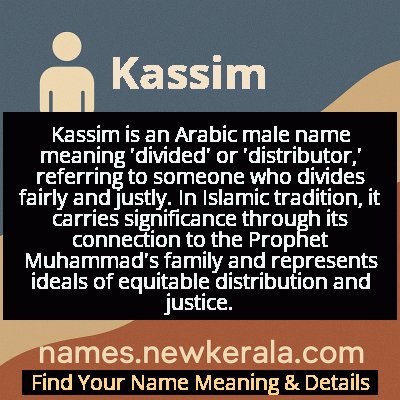Kassim Name Meaning & Details
Origin, Popularity, Numerology Analysis & Name Meaning of Kassim
Discover the origin, meaning, and cultural significance of the name KASSIM. Delve into its historical roots and explore the lasting impact it has had on communities and traditions.
Name
Kassim
Gender
Male
Origin
Muslim
Lucky Number
9
Meaning of the Name - Kassim
Kassim is an Arabic male name meaning 'divided' or 'distributor,' referring to someone who divides fairly and justly. In Islamic tradition, it carries significance through its connection to the Prophet Muhammad's family and represents ideals of equitable distribution and justice.
Kassim - Complete Numerology Analysis
Your Numerology Number
Based on Pythagorean Numerology System
Ruling Planet
Mars
Positive Nature
Generous, passionate, energetic, and humanitarian.
Negative Traits
Impulsive, impatient, moody, and can be overly emotional.
Lucky Colours
Red, maroon, scarlet.
Lucky Days
Tuesday.
Lucky Stones
Red coral, garnet.
Harmony Numbers
1, 2, 3, 6.
Best Suited Professions
Military, sports, philanthropy, leadership roles.
What People Like About You
Courage, energy, leadership, generosity.
Famous People Named Kassim
Kassim Ouma
Professional Boxer
Former IBF Junior Middleweight Champion
Kassim Osgood
American Football Player
Three-time Pro Bowl selection for special teams
Kassim Abdallah
Footballer
Played for Marseille and Comoros national team
Kassim Reed
Politician
Former mayor of Atlanta, Georgia
Name Variations & International Equivalents
Click on blue names to explore their detailed meanings. Gray names with will be available soon.
Cultural & Historical Significance
The name embodies the concept of fair distribution and justice, reflecting important Islamic values of equity and proper allocation of resources. In many Muslim cultures, naming a child Kassim is seen as honoring prophetic heritage while invoking blessings of fairness and wisdom. The name has traveled across continents through trade routes, colonial history, and modern migration, maintaining its religious and cultural resonance while adapting to local linguistic patterns. In contemporary times, it continues to symbolize a connection to Islamic tradition and values in increasingly globalized societies.
Extended Personality Analysis
Individuals named Kassim are often perceived as natural leaders with a strong sense of justice and fairness, living up to the name's meaning of 'divider' or 'distributor.' They tend to be analytical thinkers who excel at making balanced decisions and mediating conflicts. Kassims are typically known for their diplomatic skills, able to see multiple perspectives and find equitable solutions to complex problems. Their personality often combines traditional values with modern adaptability, making them respected in both conservative and progressive circles.
Many Kassims display a quiet confidence and determination, approaching challenges with methodical planning rather than impulsive action. They often possess strong family values and community orientation, valuing relationships built on trust and mutual respect. While they can be reserved in unfamiliar settings, those who know them well appreciate their loyalty, wisdom, and unwavering principles. The name seems to carry expectations of responsibility and reliability, which often manifests in individuals who take their commitments seriously and strive to be pillars of stability in their personal and professional relationships.
Modern Usage & Popularity
In contemporary times, Kassim remains a popular choice in Muslim communities worldwide, though its usage patterns have evolved. While traditionally more common in Arabic-speaking countries and South Asia, the name has gained international recognition through globalization and diaspora communities. In Western countries, Kassim is often chosen by Muslim families seeking to maintain cultural heritage while adapting to local naming conventions. The name maintains steady but moderate popularity, avoiding the extreme trends that affect more fashionable names. In recent years, there's been a slight resurgence in its usage as parents seek meaningful traditional names with strong historical roots. The spelling 'Kassim' is particularly popular in English-speaking countries as it provides phonetic clarity while preserving the name's authentic sound.
Symbolic & Spiritual Meanings
Symbolically, Kassim represents the concept of balance, justice, and equitable distribution. The name embodies the ideal of fair judgment and the ability to divide resources, opportunities, or responsibilities in a manner that ensures harmony and fairness. It symbolizes the mediator who stands between opposing forces, bringing equilibrium to conflicting situations. In a broader metaphorical sense, Kassim represents the bridge between tradition and modernity, between different cultures or perspectives. The name carries connotations of wisdom in allocation – whether material wealth, time, attention, or justice. It suggests someone who can discern true value and distribute accordingly, making it symbolic of leadership that prioritizes collective wellbeing over individual gain.

